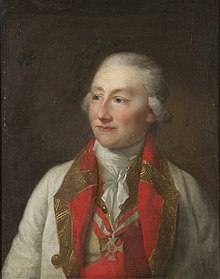Christian August von Waldeck-Pyrmont
Christian August Prince zu Waldeck (born December 6, 1744 in Arolsen ; † August 25, 1798 in the Palácio Nacional de Sintra in Sintra near Lisbon ) was a general in Austrian service and most recently Commander-in-Chief and Field Marshal of the Portuguese Land Army .
Life
Christian August was the son of Prince Karl August Friedrich von Waldeck-Pyrmont and his wife Christiane von Zweibrücken-Birkenfeld . So he belonged to the Waldeck family .
He was a friend of the arts and, like his parents, was enthusiastic about the ancient world. Therefore Italy was the destination of his Grand Tour . There he was one of the temporary companions of Johann Wolfgang von Goethe on his Italian trip. Goethe commented approvingly on a joint trip to Pozzuoli and "the company of such a perfect and well-informed prince." Waldeck suggested that Goethe travel together to Dalmatia and Greece . This from refused: "If you do once in the world, and gets involved with the world, one might be so careful that you are not caught or will probably not crazy." Later, Christian August was instrumental in the large collection of antiques in waldecker Arolsen Castle in .
Like his father, who was last in command of the Dutch army in the War of the Austrian Succession , Christian August also entered military service. In 1770 he was lieutenant colonel in the Austrian Dragoon Regiment No. 39 "Karl August Count Palatine Zweibrücken-Birkenfeld." A year later he became the commander of this unit. As a volunteer, he made the Russo-Turkish War (1768–1774) against the Ottoman Empire on the Russian side . In 1773 he returned with the rank of colonel to his Austrian regiment, the owner of which the Kaiser appointed him in 1781; henceforth it was called Dragoon Regiment No. 39 "Prince Waldeck." In 1784 he published the text "Small corrections on the attempt to establish a history of the Bavarian War of Succession." In the Austro-Ottoman War from 1787 to 1792, Waldeck served in 1788 under Field Marshal Gideon Ernst von Laudon . He won a few skirmishes and was promoted to Lieutenant Field Marshal .
As such, Christian August von Waldeck commanded a division against the French troops at the beginning of the first coalition war in 1792. While exploring Thionville Fortress , he was wounded and lost his left arm.
He was ordered to Vienna and, on behalf of Emperor Franz II, drafted a plan for the operations of the joint Austro-Prussian army in the Rhineland, which, however, was not accepted by Prussia. In arduous negotiations he succeeded in convincing the Prussian king to launch an offensive into Alsace . Christian August von Waldeck was given command of an Austrian corps under General Dagobert Sigmund von Wurmser . When conquering the Wissembourg lines , he was in command of the first attack column. With his troops he crossed the Rhine near Selz on October 13, 1793 and fell in the back of the French defenders, while Wurmser attacked the opponents head-on at Weissenburg. Waldeck thus contributed significantly to the victory at Weissenburg. He also distinguished himself in subsequent battles. After Wurmser's withdrawal in 1794, he was given supreme command of the Austrian Army on the Rhine, before handing over this command to Feldzeugmeister Johann Georg Reichsgraf von Browne (1741–1794). In particular because of his services to Weissenburg, he was awarded the Commander's Cross of the Maria Theresa Order and promoted to General of the Cavalry.

From 1794 he was the successor to Karl Mack von Leiberich, quartermaster general of the Austrian army in the (Austrian) Netherlands under Prince Friedrich Josias of Saxe-Coburg-Saalfeld . A short time later he became a member of the Court War Council in Vienna. In 1796 he received the general command in Bohemia .
In 1797 he received the offer to take over command of the Portuguese land army . With the consent of the emperor, he accepted this assignment. However, he did not succeed in reorganizing the army as he encountered opposition from some influential figures and soon died.
Christian August von Waldeck-Pyrmont is buried in the English cemetery in Lisbon . King John VI. von Portugal (1767–1826) donated a monument and tomb made of marble in the form of a large pyramid.
literature
- Louis Curtze: History and Description of the Principality of Waldeck . Arolsen, 1850 pp. 620f. ( Digitized version ).
- Constantin von Wurzbach : Waldeck, Christian August Fürst . In: Biographisches Lexikon des Kaiserthums Oesterreich . 52nd part. Imperial and Royal Court and State Printing Office, Vienna 1885, pp. 169–171 ( digitized version ).
- Julian Pallua-Gall: Waldeck, Christian August Prinz zu . In: Allgemeine Deutsche Biographie (ADB). Volume 40, Duncker & Humblot, Leipzig 1896, p. 675 f.
Individual evidence
- ↑ Report on the exhibition Antikes Leben in Arolsen ( page no longer available , search in web archives ) Info: The link was automatically marked as defective. Please check the link according to the instructions and then remove this notice.
| personal data | |
|---|---|
| SURNAME | Christian August von Waldeck-Pyrmont |
| ALTERNATIVE NAMES | Christian August Prince of Waldeck |
| BRIEF DESCRIPTION | Austrian and Portuguese general |
| DATE OF BIRTH | December 6, 1744 |
| PLACE OF BIRTH | Arolsen |
| DATE OF DEATH | August 25, 1798 |
| Place of death | Sintra |
